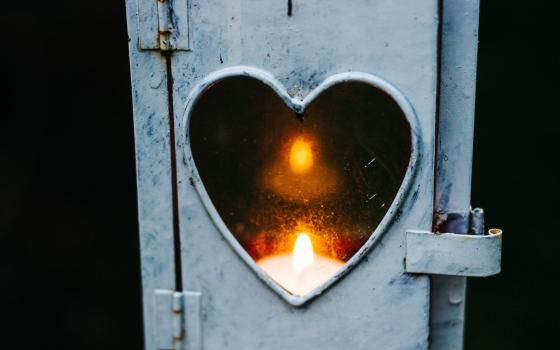As members of a contemplative community, people often ask us, "What is contemplative prayer?"
They say things like, "I have tried doing centering prayer, but it's not for me."
Perhaps it will be helpful if I tell you about the practice I do. There are many ways of doing contemplative prayer; however, this practice works for me.
When I pray, my desire is to consciously focus on opening my heart to the presence of God in my life. I find that when I do this it helps me to trust God more and to have more compassion for others.
Mornings, before the day's activities begin, are the best time for me to pray. We have an extra room upstairs where I sit on a pillow on the floor. I find a comfortable position, keeping my back as straight as possible. I can still manage to maintain this position on the floor, but I'm aware that as I age I may need to move from the floor to a chair.
Sometimes I light a candle, or burn incense, or sound a soft bell or chime. Other times I play music. I find that music is a very powerful way to open my heart and feelings as I begin my contemplative prayer.
I start by becoming aware of my breathing because breath is our life force and our closest connection to God. I begin by deepening my breath, breathing from my diaphragm. After a few deep breaths, I find my natural rhythm of breathing.
Next, I intentionally focus on calming my busy mind. The mind is used to being very active, so focusing the mind will take effort and concentration. I close my eyes, drawing my focus to my cheeks, and feel the breath flow in and out of my nostrils.
When my mind begins to wander, I use the word "one" to bring it back to my breath. Any word can be used as long as it brings your focus back to your breath. Don't make any judgments about thoughts that come up. Just accept them and return your attention back to your breath.
Having found a quiet place, focused on my breath, and having stilled my mind, I consciously become less aware of my five senses. This is very much like what I do when I prepare for sleep.
By closing my eyes, I bring my focus inward and become aware of the presence of God within me. I welcome this awareness and feel an inner joy to be in this presence.
I stay with this awareness and stillness for 20 minutes. When people ask about the length of time they should focus inward, we suggest that they start with a shorter time than 20 minutes and slowly extend the length of time as it feels right for them.
To end this time of prayer, I let my sensory feelings come back to me and become aware of the outside world. Then I hold my experience of this prayer time in my memory for a moment or two. This helps me to recall the gift of God's presence within me throughout the day.
Often, after this practice, I feel a desire to pray for others, especially the sick who have asked for our prayers. I have a string of beads that I finger while praying whatever words or prayers come to me.
I begin with a grateful heart for God's presence in my life. Then I extend my prayer to include friends, neighbors, church, and the city. Finally, I include our country, the world and its needs, and even extend my prayer out to the universe.
Thus, my contemplative practice includes not only the quiet awareness of the Divine within me, but also prayers for the outside world. Bishop Ken Untener would often say that prayer can change the balance of love in the universe.
I believe our contemplative prayer can increase the presence of love in our world and can help diminish the pain caused by hate and injustice.
[Laura Hammel is a member of the Sisters of St. Clare, a Poor Clare community in Saginaw, Michigan. In addition to the prayer ministry in her diocese, she has developed and maintained a website introducing different prayer forms useful at certain times of the year.]

